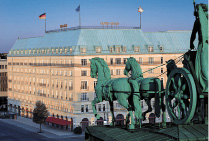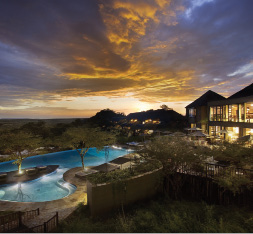- Home
- Media Kit
- Current Issue
- Past Issues
- Ad Specs-Submission
- Ad Print Settings
- Reprints (PDF)
- Photo Specifications (PDF)
- Contact Us

![]()
ONLINE

A Diversified Portfolio
Editors’ Note
Reto Wittwer began his career at The Westin Palace Hotel in Madrid. He has lived and worked in Paris, Tehran, Singapore, Hong Kong, Montreal, Acapulco, Indonesia, and Korea, and has worked for InterContinental, Mandarin Oriental, Peninsula, Le Méridien, and Hyatt. He has been the CEO of three hotel companies – Swissôtel, CIGA, and Kempinski – and assumed his current posts in 1995. Wittwer was educated at Switzerland’s Hotel Culinary School and Ecole hôtelière de Lausanne.
Company Brief
Founded in 1897, Kempinski Hotels (www.kempinski.com) is Europe’s oldest and most established luxury hotel collection with more than 60 deluxe properties in major cities and vacation spots throughout Europe, the Middle East, Africa, and Asia. Each hotel or resort is a distinctive property that celebrates the cultural traditions of its location.
How has the global economic crisis affected the hospitality industry?
Luxury products and services were affected by the economic crisis in a very different way from other industries and in a very different time frame. You have to distinguish between the luxury experience and the acquisition of a luxury good – the luxury experience is still in great demand. Nevertheless, the global economic downturn has caused many to reconsider their spending habits, especially business travelers.

Hotel Adlon Kempinski Berlin
Because of our diversified portfolio and a position of market leadership in several locations, we haven’t been as affected by the crisis as had been expected – our hotels in China, for instance, haven’t been affected at all. Over the past few months, we have also seen strong signs of recovery at our European hotels.
How was Kempinski positioned during the downturn and what is your outlook for growth for the brand?
In general, Kempinski is able to resist downturns in different economies because the company is not dependent on just one market.
The Kempinski portfolio is divided into city hotels and resorts, so the risk is managed. Many of our hotels are market leaders in their locations and drive rates. In particular, our business model of managing hotels rather than extending ourselves into real estate ownership means we were again able to limit our exposure.
Kempinski currently has 64 hotels under operation, and an impressive pipeline of approximately 60 properties under various stages of development.
Are there key markets that offer opportunities for expansion?
Kempinski’s ambitions are global, but we are focusing on the destinations where our guests expect us to be.
Kempinski is concentrating on prestigious properties in key international destinations and gateway cities, and consolidating its European portfolio with an emphasis on key European cities. After all, Kempinski’s individuality and European-ness is what sets it apart from the competition.
Furthermore we will continue to target growth in key markets in destinations like Africa, where we were pioneers.
How does Kempinski approach its food and beverage business and what is the approach to your restaurant offerings?
Food and beverage is one of the most important and challenging topics in the hospitality business due to the heavy competition of stand-alone restaurants, especially in key cities. When a hotel restaurant and bar becomes a success, it is clear that the local community has accepted us in the destination and that makes a huge difference.
As we are operating properties all over the world, our guests will always have two things on offer: on the one hand, local flair and specialties of the respective country where we are present, and on the other hand, we ensure delivery of our European service standard.

Bilila Lodge Kempinski Serengeti (right)
Luxury properties today are expected to offer a true spa experience. How much of a focus has this been for Kempinski?
To improve Kempinski’s operating value proposition, the company has entered a collaboration with leading spa consultancy Raison d’Etre, and created Resense Spa, which operates two spa concepts: Resense and Kempinski The Spa. It is a great combination, as it brings together Kempinski’s hotel management expertise with Raison d’Etre’s background in creating bespoke spas.
The Resense concept brings to life the ancient European bathing traditions – it is the renaissance of the classical European spa with a fusion of modern and traditional design, art, music, therapies, and bathing. Resense will be available to Kempinski hotels, other hotel management companies, or as stand-alone spas.
Kempinski The Spa is a luxurious yet simple concept that can be incorporated easily across all Kempinski Hotels and adapted to their geographical location without compromising the hotel’s aura of five-star exclusivity. Kempinski The Spa will only be available to Kempinski Hotels. The Grand Hotel Kempinski High Tatras celebrated the opening of the first Kempinski The Spa, followed shortly by the Hotel Vier Jahreszeiten Kempinski Munich and the Siam Kempinski Hotel Bangkok.
How much of an impact has technology had on the business?
Optimizing our efficiency and enhancing our infrastructure are important topics. To ensure that best practices, policies, and procedures are in place and being followed throughout the company, the implementation of various company-wide systems has been introduced, such as e-collaboration tools, which allow us to not only share our knowledge and keep it within our staff, but also to follow interdisciplinary projects step by step, often involving several departments.
Nevertheless, these are mostly internal tools that don’t influence guest contact directly. For example, in spite of having a state-of-the-art booking engine on our Web site, most loyal guests prefer to pick up the phone and make a reservation directly. That human interaction will never be replaced by a system or a computer.
The most important topic for us is people, and that is also what I am personally passionate about. Making a real difference in the hospitality industry only works if you have the right people doing the right thing at the right time. So we follow a very unique corporate culture of identifying talent internally, and at the same time, providing the correct training to newcomers, ensuring the future of the company is in the right hands.
What are your key priorities for 2011?
In the years to come, the war for talent is going to be the most challenging in the history of the hospitality business. The search for talent is extremely important for Kempinski. Based on our projected portfolio growth, the company will need to double its workforce over the next five years. We will need about 60 new General Managers to support new openings alone. My key priority is to ensure that we have the right people on board for our worldwide expansion.•